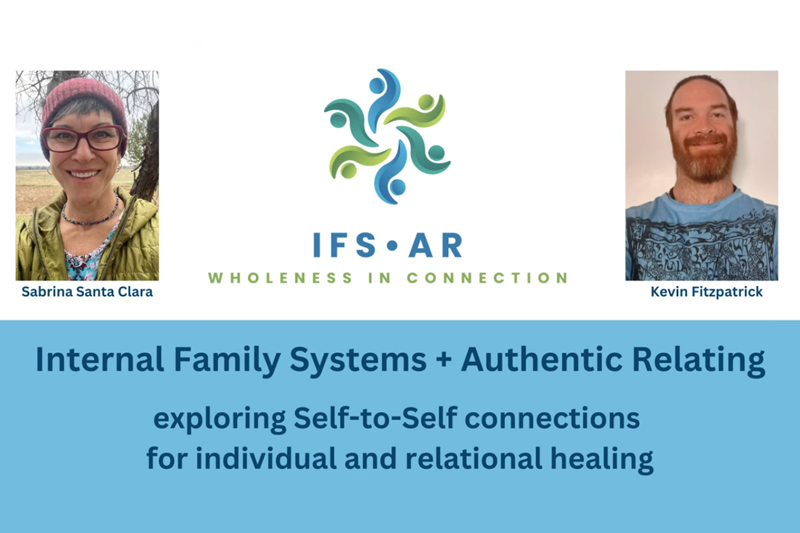
Similarities of Internal Family Systems (IFS) and Authentic Relating (AR)
IFS and AR are two distinct approaches, but they share some similarities in their emphasis on self-awareness, understanding interpersonal dynamics, and fostering personal growth.
Emphasis on Self-Awareness: Both IFS and AR prioritize self-awareness. In Internal Family Systems, individuals explore and understand different parts of themselves to harmonize internal aspects. In Authentic Relating, participants concentrate on being present and aware of thoughts, emotions, and behaviors within interpersonal interactions.
Mindfulness and Presence: Mindfulness and presence are integral components of both IFS and AR. In IFS, individuals practice being present with their internal experiences, and in AR, participants cultivate mindfulness in the context of interpersonal communication.
Body Awareness and Sensations: IFS-AR and IFS involve attending to bodily sensations as part of the mindfulness practices.
Facilitation of Emotional Expression: Both IFS and AR provide a space for the expression of emotions. IFS encourages individuals to communicate with and understand their different internal parts, including those carrying emotions. Authentic Relating involves expressing authentic feelings and thoughts in the moment during interpersonal interactions.
Focus on Connection: Authentic Relating and Internal Family Systems both recognize the importance of connection, whether it’s connection with others in the case of AR or the internal connection with one’s various parts in IFS. Both approaches acknowledge that meaningful connections contribute to personal well-being and growth.
Non-judgmental Exploration: Both approaches encourage a non-judgmental exploration of one’s internal experiences or interpersonal dynamics. They promote curiosity and openness to understanding oneself and others without criticism or condemnation. IFS promotes understanding and acceptance of internal parts without judgment, while AR fosters an environment where individuals can express themselves authentically without fear of judgment.
Holistic View of Self: Both approaches adopt a holistic view of the Self. IFS sees individuals as a system of interconnected parts, and AR recognizes the complexity of human interactions, considering various aspects of individuals within a relational context.
Integrating IFS and AR (IFSAR)
Using AR skills to work with parts: Learning the practices of Authentic Relating (AR) offers a valuable application to the internal parts of the system. This proves especially beneficial for polarized parts, fostering a profound understanding. By engaging the Self, individuals can guide parts in accessing their inherent Self (as all parts possess a Self). This facilitates the learning of mindfulness, presence, and a curious exploration of the parts with which they may be polarized.
Bringing parts connection into the framework of Authentic Relating: In Internal Family Systems (IFS), the distinction is made between speaking for our parts rather than from them. However, Authentic Relating (AR) excels in imparting interpersonal practices for genuine connections, encompassing the understanding of how others and their impact resonate within us and our internal parts. Given that internal parts manifest in external relationships, extending the learned dynamics of the internal Self-to-parts relationship to a Self-to-other’s-parts and Self-to-Self relationship enhances intimacy, authenticity, and connection.
Bringing historical context into Authentic Relating: While Authentic Relating (AR) places a primary emphasis on staying in the present moment, Internal Family Systems (IFS) shares this focus while additionally fostering curiosity about the broader context of the present experience. In IFS, the exploration extends to questions like “Is this feeling familiar?” or “How long has this part been with me?” Inviting both the richness of the present moment and the exploration of historical context, as practiced in IFS, has the potential to enhance and deepen the Authentic Relating experience.
Balancing out the Self (vs. community) bias of IFS: Internal Family Systems (IFS) places a strong emphasis on the Self in the Self-to-parts relationship as the primary source of healing within the internal system. While the challenges arising from parts influencing relationships with others are addressed, there is a less pronounced acknowledgment of the essential role of needing others and community in our complete healing process. In contrast, Authentic Relating (AR) places a greater emphasis on external relationships as an intrinsic component of the healing journey. In reality, both perspectives are equally indispensable to achieve holistic healing.
Sharing Vulnerability: Authentic Relating (AR) fosters an environment where participants are encouraged to authentically share, embracing vulnerability. This openness to vulnerability can be further enriched by not only sharing one’s personal parts but also by articulating their perspectives, deepening the connection through speaking for the parts rather than solely from them.
Exploring Parts in Group Dynamics: Many of us experience interpersonal “dynamics” or the emergence of distinct parts in group settings. The combination of Authentic Relating (AR) with Internal Family Systems (IFS) offers a thoughtful model for addressing the challenges presented by these parts within a group context, providing them an opportunity for healing through the interconnected dynamics.
Connection with Others Doing IFS: In therapeutic or group settings where individuals are actively engaging in Internal Family Systems (IFS), integrating IFSAR can significantly foster greater cohesion and safety within the group. This approach proves particularly valuable in psychedelic groups, contributing to the establishment of connectivity and enhancing the safety of the set and setting, especially when strangers embark on journeys together.
Resources

Join Our Mailing List
Join my mailing list to receive the latest information on trainings, group consultations as well as helpful videos, meditations and other recordings. You’ll receive your free ebook on 16 Skills to Move You From Freaked-Out to Chilled-Out


